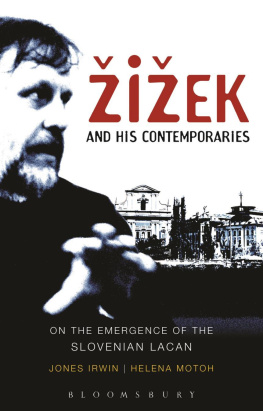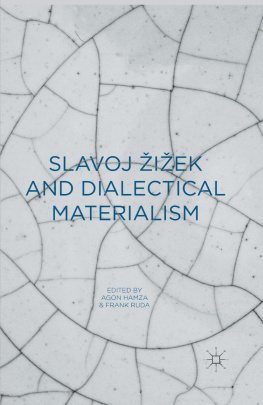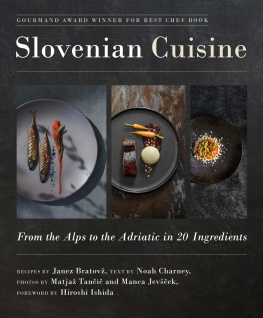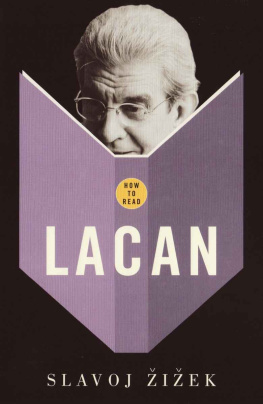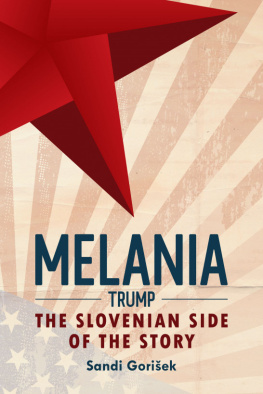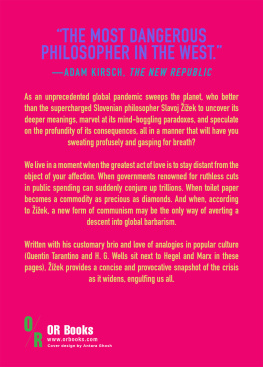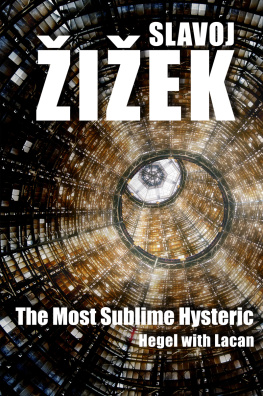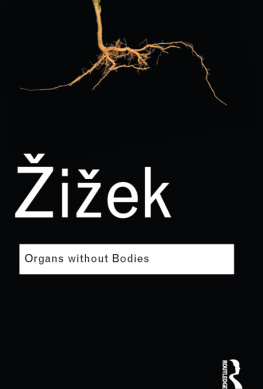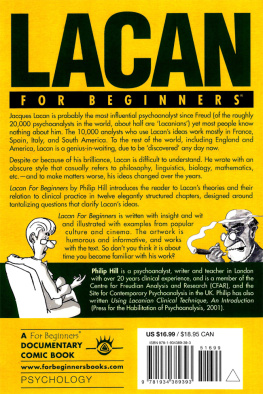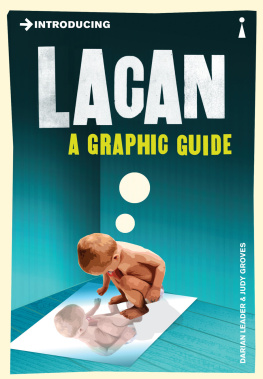iek and his Contemporaries
For Elose
To Sta and Adam
Also available from Bloomsbury
Interrogating the Real , Slavoj iek
The Universal Exception , Slavoj iek
Slavoj iek: Live Theory, Rex Butler
iek: A Guide for the Perplexed, Sean Sheehan
iek and his Contemporaries
On the Emergence of the Slovenian Lacan
JONES IRWIN AND HELENA MOTOH

CONTENTS
At St Patricks College, Drumcondra, Jones Irwin would like to thank his supportive colleagues in the respective groups in Human Development and the Education Department. Thanks to the troika, that is Mladen, Slavoj and Alenka, for such (ethical-political) good will and great interviews. Thanks to Helena for starting and maintaining the whole thing with such balance. To Melissa and the gang (i.e., Elose, Jeremy, Gregory and Max) for inspiration. To Tom Crick and then Rachel Eisenhauer at Continuum and then Bloomsbury for editorial help and support. To Malahide library staff for a friendly space to work. Thanks also to Lenart, Pavel, Darko and Slavko who were so hospitable on my first, original trip to Slovenia (Koper and Ljubljana) in December 2008. Specific aspects of the Epilogue were originally published in the Avello journal, Issue 1, Volume 2.
Jones dedicates this book to his eldest child, his beautiful daughter Elose, who thinks philosophy may or may not be worth all this effort.
Jones Irwin, Dublin, 15 October 2013
Helena Motoh would like to thank the University of Primorska, where her research is based, and especially her colleagues from the Philosophy department at the Faculty of Humanities and the Institute of Philosophical Studies at the Science and Research Centre of Koper for the support and inspiration. She would like to express sincere gratitude to Jones for taking on such a large part of this project. She is joining him in expressing thanks to the three authors presented in the book, for their kind help and willingness to participate in yet another interview, and to Bloomsbury for assistance and support in the shaping of this text. A humble thanks to Miha and two little guys who are growing up in the midst of philosophical debates, which is not always an easy thing to do. To Sta and Adam she also dedicates this book.
Helena Motoh, Ljubljana, 15 October 2013
Fucked by the Absolute/ fed up with virgins and other dying sufferers/ I love you o neighbors, meek fantasies of God the Father/ I love you o integral characters of sweet gazing/ In my mind grace yielded// O proud possessors of anxieties/ O trained intellectuals with sweaty little hands/.... I walked our land and got an ulcer/ Land of Cimpermans and pimply groupies/ Land of serfs myths and pedagogy// O flinty Slovenians, object of history crippled by a cold .
( ALAMUN DUMA [ Word ])
We [myself and my group] had been ultraorthodox Lacanians from roughly the mid 1970s onwards.
(IEK AND DALY 2003: 33)
In recent years, Slovenian intellectuals with a strong (or orthodox) Lacanian emphasis have had a very significant influence on the international development of philosophical thinking. Led inimitably by Slavoj iek, this foregrounding of Slovenian thought has also been influential outside the groves of academe, with ieks distinctive personality in particular generating a movie in his name (iek 2007b) and has been the subject of much media attention.significance of this movement or shared sensibility. Although only coming to international notice in the early 1990s, Slovenian neo-Lacanianism needs to be understood as the culmination of a whole series of intellectual and political movements inextricably connected to the quest for Slovenian national independence from Yugoslavia, especially from the late 1970s onwards. In Slovenia, these movements originated in the punk music counter-culture and evolved into a significant avant-garde and alternative movement known as Neue Slowenische Kunst (NSK; New Slovene Art), which included the internationally recognized group, Laibach, the visual artists IRWIN and the theatrical group Sestre Scipion Nasice. Monroe (2005) has described the latter as, for example, the most important avant-garde of the second half of the twentieth century and the last avant-garde. The philosophers we will be concerned with were also participants in and influential on the NSK, in various significant ways (most especially as the movement influenced the political process).
This book will attempt to do justice to this complex and fascinating history, with interviews with the leading philosophical figures of the movement (iek, Zupani and Dolar) as well as an analysis of the wider new social movements in Slovenia. One of the authors, Helena Motoh, is herself a Slovenian philosopher of the younger generation and, as such, has a lot of local insight and understanding of both the political and intellectual dynamics of the development of this very specific strand of thinking. The other author, Jones Irwin, is also a younger philosopher with a specific expertise in 1960s or 1970s French philosophy, which was to be so influential on later Slovenian thinking. One significant factor here relates to the fact that unlike other Yugoslav republics or indeed the wider Eastern bloc, Slovenian intellectuals were allowed to travel to and study in Paris in the 1970s and 1980s, which created a greater cosmopolitanism in Slovenia than in its neighbouring countries. Additionally, many of the significant Slovenian intellectuals who studied abroad chose to return to Slovenia after their studies rather than go into exile. This latter was obviously a significant factor in the strengthening of Slovenian philosophy at home.
While our book is subtitled the emergence of the Slovenian Lacan, the trio or troika of thinkers, who we will be most concerned with, are more specifically associated with the city of Ljubljana. Thus, their work is often referred to (by themselves also) as part of a Ljubljana School of Psychoanalysis. This is the name we will use consistently throughout the book for the activities of this group of thinkers. Nonetheless, there is also a wider focus to their work. First of all, this focus takes its cue from the national context of Slovenia as well as from the wider relationships in the former Yugoslavia, coming under the self-management socialism of Tito. We will discuss this former Yugoslavian context in most detail in Chapter 1, as it evolves from the 1970s through the controversies and Balkan wars of the 1980s and 1990s, including independence for Slovenia. One of the most curious aspects of this history is the specific orientation towards Lacanianism which we can see emerge in the Slovenian context of theory and politics. Monik (1993) has given an excellent analysis of this evolution and spoken of it significantly in terms of the impasse associated with other structuralist (and post-structuralist) philosophies, with Lacans philosophy being designated as a breakthrough moment. Not least of the dilemmas which this book will seek to address is the fact that the most enigmatic of all philosophical and theoretical systems in the twentieth century (that of Jacques Lacan, as friend and foe would agree) has come to have had such a key role in practical, political and sociocultural struggles in recent times. What is it about Lacans philosophical system (if we can speak in such a way), which allows or enables this kind of political activism, of such a radical sort? Moreover, we will see in the context of the Ljubljana School of Psychoanalysis that they too (iek, Dolar and Zupani) will come to play a crucial role in their own national, political and sociocultural struggles (leading up to independence). Also, recently, their work has taken on paradigmatic significance on a more global level, in terms, for example, of intra-leftist discussions (and diatribes) (Laclau 1989; iek et al. 2000) as well as discussion and inspiration around the Arab Spring and the Occupy movement in the last 2 years (iek 2012b). This proximity to political events is in stark contrast with many other so-called political philosophies (on the surface, often far more seemingly accessible and relevant) which often inhabit a purely intra-theoretical or more rarefied academic space (having little or no impact on Realpolitik) (Monik 1993; Mastnak 1988).
Next page
